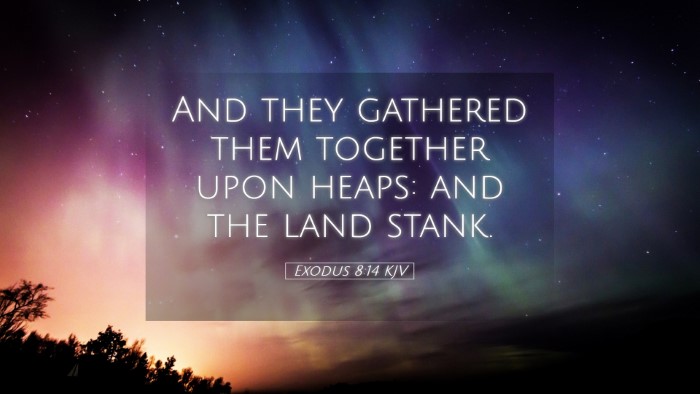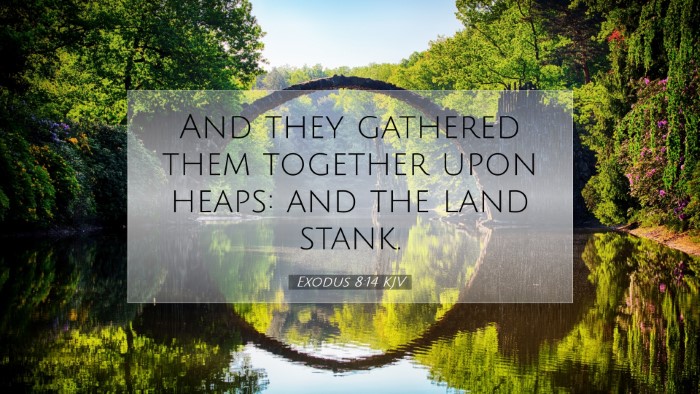Exodus 8:14 Commentary
Bible Verse: Exodus 8:14 - "And they gathered them together upon heaps: and the land stank." (KJV)
Introduction
The plague of frogs has taken a significant turn in Exodus 8, leading to a grim consequence for Egypt. The aftermath of the frogs’ abundance becomes a critical moment in God's demonstration of power over the deities of Egypt, and contention between Moses and Pharaoh escalates.
Contextual Background
The context of this plague is essential for understanding its implications. Pharaoh, in a moment of desperation, had requested relief from the overwhelming presence of frogs, which Moses had called forth as part of God’s judgment against Egypt for their idolatry and refusal to release the Israelites from bondage.
Summary of the Verse
In Exodus 8:14, the gathering of the dead frogs results in a "stank" that befell the land of Egypt. This phrase emphasizes not just the physical decay of the frogs but symbolizes the pervasive corruption and judgment resulting from Pharaoh's hardened heart.
Theological Implications
This passage illustrates significant theological themes, including the nature of divine judgment and the consequences of disobedience. The "stank" acts as an olfactory manifestation of the decay of Pharaoh’s empire in light of rejecting God's commands.
Divine Sovereignty and Judgment
Commentators like Matthew Henry emphasize God's sovereignty over nature and human affairs. The gathering of the frogs serves as a critical reminder that while God can bring forth blessings, He can also unleash plagues as a form of judgment.
Pharaoh's Hardening Heart
Albert Barnes notes that Pharaoh’s response reflects a continued hardening of heart, demonstrating the peril of persistent sin. The "stank" is not merely a physical offense, but it also signifies the spiritual and moral decay that results from rebellion against God.
Insights from Commentaries
-
Matthew Henry: Highlights that this plague, though horrific, is a means through which God seeks to display His power. The outcome—gross stench—acts as a divine commentary on sin and its consequences.
-
Albert Barnes: Provides insight into the multi-layered meaning of the "stank," suggesting that it reflects both the physical effects of the judgment and a deeper spiritual decline within Pharaoh and his people.
-
Adam Clarke: Offers a perspective on the societal implications of such a judgment, noting how public spaces and the overall atmosphere were corrupted, leading not only to physical ailments but a corresponding psychological distress among the Egyptians.
Practical Applications
The verse serves as a stark reminder for pastors and students of scripture regarding the seriousness of sin and its effects on society. Theologically, it illustrates the consequences of ignoring divine warnings.
- Reflection on Personal Sin: Believers should consider the implications of their sin, recognizing that it can lead to personal and communal decay.
- Importance of Obedience: The narrative stresses the necessity of adhering to God's call and conveys a call to responsiveness to divine revelation.
- Symbol of Redemption: Just as God brings judgment, He also offers redemption, urging individuals to turn from sin and seek purity through Him.
Conclusion
Exodus 8:14 captures a period of judgment that serves as a profound warning against hard-heartedness before God. By reflecting on the implications of this scripture, pastors, students, and theologians are challenged to recognize both the urgency of repentance and the reality of divine justice intertwined within the narrative of Exodus.


